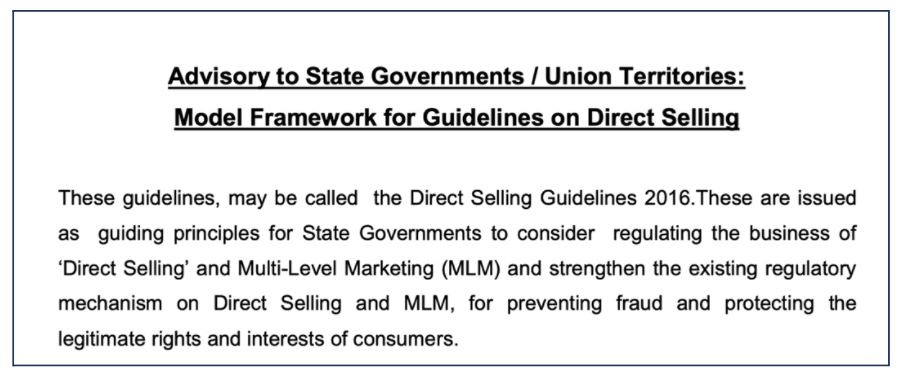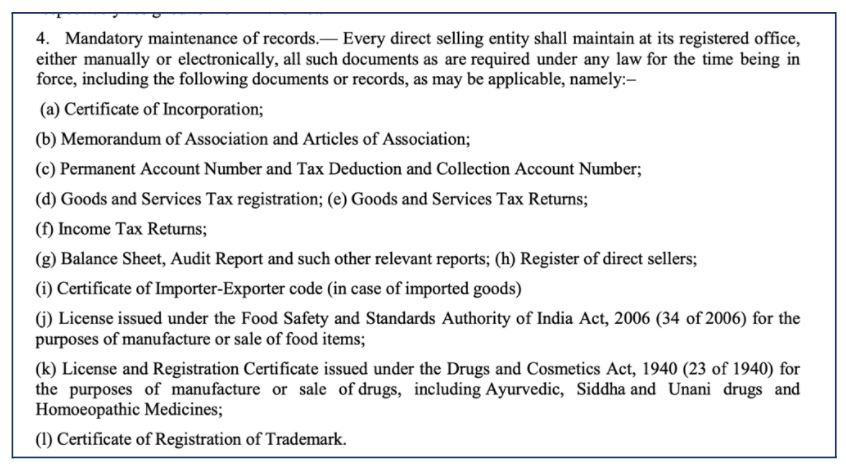The government recently notified the Consumer Protection (Direct Selling) Rules, 2021 to regulate the direct selling industry. The rules are also aimed at clearly prohibiting pyramid and money circulation schemes and providing a framework for consumer protection. Here is an explainer.
The Department of Consumers Affairs recently on 28 December 2021, notified the Consumer Protection (Direct Selling) Rules, 2021. These rules specify the compliance requirements for direct selling agents.
As per the definition provided in the Consumer Protection Act, 2019, Direct selling means
“Marketing, distribution and sale of goods or provision of services through a network of sellers, other than through permanent retail location.” Direct selling is one of the approaches for the promotion and sale of goods & services.
The new rules bring in regulation to hitherto largely unregulated market
This segment has largely remained unregulated in India, and the current rules are aimed at bringing in some form of regulation. With the lack of a specific regulation related to direct selling, direct sellers used to be covered under – The Prize Chits and Money Circulation (Schemes), Banning Act, 1978.
However, there were instances of direct sellers being wrongly booked under this act, even though they complied with all the other relevant regulations required to do business in India.
In 2016, the Department of Consumer Affairs has issued “ Model Guidelines on Direct Selling” as an advisory to State Governments & UTs regarding Direct selling.

This advisory included broad guidelines to the States, with the respective states required to come up with their own regulation. With the Consumer Protection and Direct Selling Rules, 2021 in place, there is going to be uniform regulation of Direct selling across the country.
The rules explicitly prohibit any form of Pyramid schemes under the guise of Direct selling
The Consumer Protection & Direct Selling Rules, 2021 state that these Rules are applicable to all the goods & services that are bought or sold through direct selling, to all models of direct selling, to all direct selling entities offering goods & services in India, etc.
Thus, these rules are applicable to all one-to-one sales, multi-level marketing, etc. However, Pyramid schemes are strictly prohibited. In its definition of the direct selling entity, the Rules explicitly state that it does not include an entity that is engaged in a Pyramid scheme or Money circulation scheme.
The Rules also clearly define a Pyramid scheme as one that has a multi-layered network of subscribers who are involved in enrolling more subscribers to receive any benefit, either directly or indirectly.
While clearly stating that Pyramid schemes do not fall under the legal framework of Direct selling, the definition of “Direct seller” also excludes a few other entities.
- A retailer has a shop front or location to carry on the sales, as the definition states “Other than through permanent location.”
- Employees or agents appointed by organizations in promotional activities. The Rules state that a Direct seller is “a person authorized by a direct selling entity through a legally enforceable written contract to undertake direct selling business on a principal-to-principal basis.” Since they are appointed, any selling through promotional activity is not considered as direct selling.
- Direct Selling Agents (DSA’s) appointed by any financial institution are also excluded.
Direct Selling entities to ensure compliance with the Rules within 90 Days
The Consumer Protection and Direct Selling Rules, 2021 lay down the compliance framework to be undertaken by all the entities which fall under the definition of a Direct seller.
A few of the important rules for the Direct selling entities include:
- To mandatorily maintain documents such as the Certificate of incorporation, PAN, TAN, IT Returns, GST registration FSSAI licence in case of food items, etc. among various others.
- Entities to have at least one physical location in India and obtain necessary trade registrations as per Indian law.
- Mandatory to store customer-sensitive data in Indian and make adequate safeguards.
- Entities are to be responsible for monitoring the direct sellers and taking care of grievances arising out of goods sold by direct sellers.
- To have a grievance redressal officer.
- Maintain a well-functioning website and provide the prescribed information to increase transparency with customers.
- To regulate the direct sellers to curb any malpractices adopted by sellers while selling the products or services.
All the entities that fall within the definition of Direct seller are to ensure compliance with these rules within 90 days.
The new rules also lay down obligations to be met by the Directs sellers:
- Have a prior written contract with the Direct selling entity.
- Disclose the identity of the direct selling entity at the time of sales initiation.
- Provide accurate information on prices, terms of payment, refund policy, return policy, etc.
- Provide an order form containing complete information of the direct seller or direct selling entity.
- Obtain GST registration, PAN registration, all applicable trade licenses, etc.
- Ensure product delivered matches with description of the product.
- Take appropriate steps to ensure the protection of sensitive personal information of the consumer in accordance with laws.
One of the important aspects of the Rules is that the direct selling companies are liable for the grievances arising out of the sale of goods or services by their direct sellers.
Direct selling entities and direct sellers using e-commerce platforms for sale also need to be compliant with The Consumer Protection (Direct Selling) Rules, 2021.
These rules also require the State governments to set up a mechanism to monitor the activities of direct sellers and direct selling entities.
Direct selling rules issued recently have an international precedent
While India has recently brought about the legal framework for Direct selling, many other leading countries already have laws in place.
USA
USA’s Federal Trade Commission (FTC), highlights that MLM activities are unlawful and violate FTC Act. The FTC act lays down the regulations regarding methods and practices of entities engaged in commerce.

Singapore
Multi-Level Marketing and Pyramid Selling (Prohibition) Act, explicitly excludes certain schemes and arrangements which are MLM or Pyramid schemes. The act is intended to protect consumers and promote conducive environment for legitimate businesses.
The Consumer Protection (Fair Trading) Act, 2003, provides the legislative framework to allow consumers aggrieved by unfair practices and the civil remedies.
United Kingdom
The Direct Selling Authority in UK oversees the various aspects related to Direct selling, both from the perspective of Direct sellers and costumers.
Few of the important laws related to Direct selling and protection of consumer rights regarding direct selling include – The Consumer Protection (Cancellation of Contracts Concluded away from Business Premises) Regulations 1987 & its amendment in 1988, and The Doorstep Selling Regulations.
Most of these legislations make a clear demarcation of what constitutes direct selling and what are MLM or Pyramid schemes which are not part of the legal framework. Customer redressal mechanism is also a key component of the law in place for many of these countries.
As per a factsheet of ‘World Federation of Direct Sales Association (WFDSA) ‘, Direct selling is a $179.3 billion industry worldwide and encompasses 125.4 million independent representatives, as of 2020. United States, China, Germany, South Korea, and Japan are the top-5 markets for Direct sales.
The size of Indian market for direct sales is around $ 3.2 billion. With an expanding consumer based and direct selling platforms, the new regulation by the government is an important step to ensure customer safety and lay down a legal framework for better enforcement.
Featured Image: Direct Selling Rules







